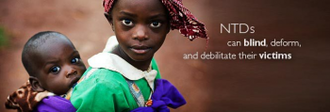'The most important diseases you have never heard of'

In 1014 Byzantine Emperor Basil II defeated the Bulgarian army and captured 15,000 prisoners. He could have killed them but he had a different idea - he wanted to weaken his opponents for decades to come. He ordered 99 out of every 100 prisoners to be blinded while the 100th was spared one eye in order to guide the others back home forcing their communities to care for them for the rest of their lives.
Today humans are subject to an attack just as cynical as the Emperor's by a group of super villains known as Neglected Tropical Diseases (NTD's). It is estimated that one in seven humans on the planet (400 million people) suffer from one or more NTD's more than the entire population of Europe. They do unimaginable damage. By crippling countless people they destroy billions of dollars in income, weaken communities and slow progress.
They can be caused by worms, amoebas, bacteria or viruses and their list of symptoms is as diverse as their methods of transmission all of which is truly the stuff of nightmares! NTDs are a group of infectious diseases that are the source of tremendous suffering because of their disfiguring, debilitating, and sometimes deadly impact. Many NTD's have gruesome symptoms and social stigma is often a major consequence of these diseases. In addition to causing physical and emotional suffering, these devastating diseases hamper a person's ability to work, keep children out of school, and prevent families and communities from thriving. They are called neglected because they have been largely wiped out in the more developed parts of the world and persist only in the poorest, most marginalized communities and conflict areas and in countries where access to health-care services is insufficient to cover essential needs.
In November the Pontifical Council for Health Care Workers held an International Conference on NTD's. In his keynote address President of the Sabin Vaccine Institute, Dr Peter Hotez told the delegates: "Today I am going to introduce a group of diseases I sometimes call "the most important diseases you have never heard of," what we first named back in the early 2000s as the 'neglected tropical diseases' or NTDs. These are diseases borne of poverty and conflict - two challenges at the heart of the social mission of the Catholic Church." He continued, 'NTDs are ancient afflictions described in the Bible and other ancient texts. Today, NTDs are having a horrific impact on the world's Christian populations living in poverty. Christian majority countries account for most of some of the highest disease burden NTDs such as Chagas disease, sleeping sickness, schistosomiasis, and others.
In his message to the conference Pope Francis said that the challenge the world faced 'involves responsibilities and commitments on a global scale: international and national health-care and political authorities, health-care workers, the biomedical industry, associations of citizens/patients, and lay and religious volunteers.' Therefore, he suggested 'an integrated approach' was needed as well as 'the obtaining and management of the necessary sizeable resources'. Pope Francis called for a 'a multidisciplinary and joint approach' together with 'an effort that calls on all the human realities involved, whether institutional or otherwise.'
The fight against NTDs has gained momentum over the last decade. As NTD treatment and prevention programs in many countries have scaled up, the prevalence of some NTDs has dropped dramatically. For instance, four Latin American countries have eliminated river blindness in as many years, leaving only a few communities in a remote region of the Amazon rainforest on the border of Venezuela and Brazil at risk of the disease. Recent efforts to wipe Dracunculiasis off the globe have resulted in the elimination of 99.9 percent of these worms. (in 1986 there were about 3.5 million cases of Dracunculiasis infections, while in 2015, there were only 22). Dr Hotez said that "new strategies and tools are needed and echoed Pope Francis' words when he said, 'In this new era of development, as we seek an integrated approach to combat the diseases that thrive in poverty and conflict, we urgently need new diagnostics, drugs, and vaccines to end the suffering caused by these diseases.'"
Vaccines such as those currently in development by the Sabin Vaccine Institute could be powerful tools. Yet this research and development is severely under funded'' while neglected tropical diseases are often in countries where access to health-care services is insufficient to cover essential needs.
In his address Pope Francis said: "At the base of every initiative, however, lies, first and foremost, free and courageous good will directed towards the solving of this major problem of global health: an authentic 'wisdom of the heart'."
The 'In a nutshell' web site recently produced a video about NTD's www.youtube.com/watch?v=qNWWrDBRBqk It concluded: "We as a species can really do great things than with no other motivation than to help each other." I think Pope Francis would agree!
For further reading:
Pope Francis Pope Francis Message to the participants in the thirty-first international conference of the Pontifical Council for Health Care Workers: http://en.radiovaticana.va/news/2016/11/12/pope_francis_message_to_health_care_workers/1271754
Keynote address by Sabin Vaccine Institute President Dr. Peter Hotez at the Pontifical Council for Health Care Workers' XXXI International Conference, focused on NTDs and rare diseases. www.sabin.org/updates/blog/neglected-tropical-diseases-21st-century-ancient-afflictions-poor-and-vulnerable
The One Foundation: www.one.org/us/2016/11/17/why-this-vatican-conference-is-focusing-on-rare-diseases-and-neglected-tropical-diseases















